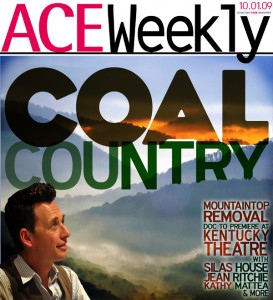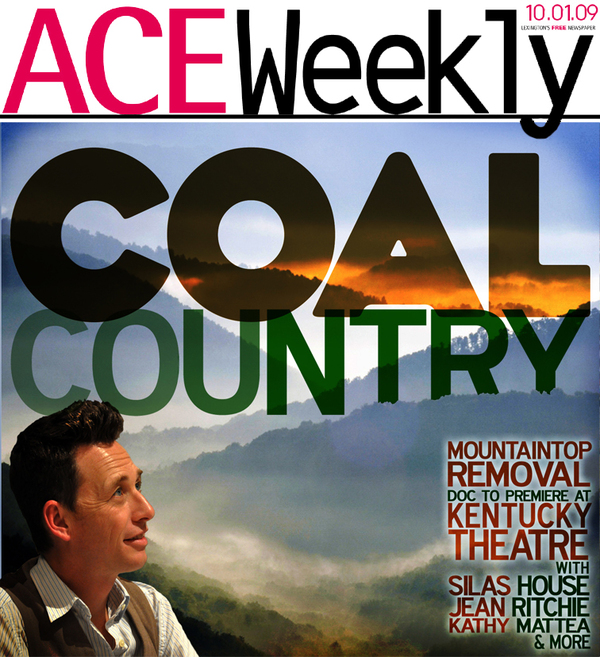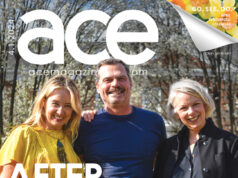[two_third]
Coal Country Documentary premieres at the Kentucky Theatre
By Kim Thomas


“There’s just no such thing. Sure, it might be a teeny-tiny percent less polluting, but it’s still polluting. And besides, when people hear the term ‘clean coal’ they sometimes forget that the ‘clean’ is only referring to the pollutants it puts out. But so-called clean coal is still mined in a harmful, destructive way when it is mined via Mountaintop Removal.”
An outspoken activist against mountaintop coal removal, or MTR, Kentucky’s bestselling author and playwright, Silas House will be a featured guest at the October 7 premiere of the documentary Coal Country. House (who just released his latest work, Eli the Good, a look at the complexities of childhood and the reality of war) will join Kathy Mattea and Jean Ritchie at the event for a pre-show discussion when Coal Country opens at the Kentucky Theatre (7:30pm).
When asked what he believes the role of coal has been in Kentucky’s past, current, and future economy, House says, “I think it’s real interesting that when tobacco farmers started to make the transition away from
growing tobacco, the government stepped in to help them transition to other crops.
“Yet to my knowledge the government has no plans to help small coal companies transition to other forms of work once coal peters out (as it most certainly will, very soon, based on all the statistics I’ve seen). It’s always the small companies and the local workers who suffer in a coal economy. That’s one thing that’s hard to make clear in the fight against MTR: most of the people fighting MTR are in it not only for trees and mountains, but because the statistics clearly show that the industry is taking jobs out of the region. So these big corporations come in and reap all the benefits and the small local companies suffer for it.”
House believes there a number of ways to use “clean energy” alternatives to develop Kentucky jobs and revenue. “We have all kinds of clean energy options here in Kentucky if we would just start to even have a dialogue about them. There are a committed bunch of folks in Harlan County who are really working hard to start a wind farm, for instance, but a lot of people just roll their eyes when I say this. I don’t know why people think harnessing the wind is ridiculous, yet they think cutting the tops off ancient mountains are not.”
How does he suggest we reconcile a love for the land and for the Eastern Kentucky people who say they need coal jobs to make a living? He responds,“I think that the coal industry has done a great job of creating a monoeconomy. We ARE dependent on coal for our economy, so that’s why it’s so obvious that we have to start thinking of alternative forms of energy for Kentucky, because coal is definitely going to be gone before too much longer. They’re mining it faster than they ever have before and it won’t even last as long as first predicted.”
“I think MTR makes people feel beaten down, and inferior. Because when something as disrespectful as MTR is allowed to take place, it makes us, the citizens, feel as if corporations are more important than individuals. So we have to speak out and say we’re tired of it. We have a responsibility to our children, to the future, to do that,” House adds.
Where does House see the role of coal in Kentucky a decade from now? “In the best case scenario coal will be mined lawfully and respectfully, in the least harmful way to the environment and the people of Kentucky. In the worst case scenario, whole huge parts of our beautiful state will be laid to waste by this destructive and irresponsible form of mining. It doesn’t have to be this way. Coal has been mined for more than a century in a way that didn’t absolutely destroy the land, so it can go back to that.”
Kathy Mattea is also passionate when she speaks of how mountaintop removal impacts those who live in the wake of the devastation and so-called reclamation caused by MTR. “I saw some reclamation that looked good … I saw some reclamation that they said was good, but I didn’t agree with. I said, ‘well … that looks like a golf course, but that’s the ugliest golf course I’ve ever seen.’“
Singer/songwriter Mattea believes it is a question of the biodiversity that’s being lost. “A bunch of trees do not a forest make … not these kinds of forests. If you are person who lives next to one of these mines … if you have a mine within a half a mile of your house … this thing’s gonna be mined for decades. If these are the decades that are the prime of your life, it doesn’t matter if they reclaim, your life has turned into hell. If it’s prime of your life, and the entire contour of the land, the makeup of the forest, and life as you know it gets completely altered, what
you’ve lost is not quantifiable, but profound.”
“You know, I met a coal mining operator who bends over backwards to try to stay within the environmental parameters that have been laid out, and, in fact, his employees were proud, really proud of their work,
because they said, ‘we’ll go further than we’ll have to.’ I can really see their frustration for not being seen for what they are trying to do. By the same token, all of that discussion takes place with the premise that mountain top removal is okay to begin with, and that’s the discussion we need to have. It’s really hard.”
Mari-Lyn Evans
Co-producer Mari-Lyn Evans thinks finding a solution to coal, “the dirtiest of all fossil fuels” is urgent. “She says, “Many scientists do not believe that there is such a thing as ‘clean coal’ as it has been portrayed in the many commercials paid for by the coal industry. The one concern that I hear most is that even if you can capture and sequester it, you still have MTR mining.”
Evans emphasizes that “wind and solar energy are alternatives being explored by groups like The Sierra Club and scientists. There are also groups like Kentucky for the Commonwealth, which are piloting projects.”
Coal companies using mountaintop removal as a method for easy access to coal have removed enough topsoil to cover an area the size of the state of Delaware and while doing so, more than 800 streams and creeks which had provided water for thousands of communities have been filled and the flow of water stopped. The effort to
increase awareness of the problem has been taken up by national organizations, such as The Sierra Club, and in Kentucky, by dozens of grassroots groups.
For example, ELandF Gallery organized a reading last Tuesday on One Web Day, and had former Lexington actor Tom Phillips (now living in L.A.) read a ‘found’ essay titled ‘We Are Mountains’ at the symbolic end of the power grid, on the Venice Beach webcam.
Initiatives from Kentuckians for the Commonwealth can be seen at www.kftc.org.
Coal Country will premiere at the Kentucky Theatre on Wednesday, October 7, 2009.
Kim Thomas is a Lexington Writer, legalsecretary, and a member of the Chancel Choir.
[/two_third]
[one_third_last]
The Film
Written produced and directed by Phylis Geller, with Executive Producer Mari-Lynn Evans, ‘Coal Country’ delves into small towns in rural West Virginia, Virginia and Ohio and spotlights the larger than life members of these communities who have brought the issues and dangers of mountaintop removal to the national consciousness. The film also profiles a mining executive..
The Broadcast
Making its national television debut, Discovery Networks’ Planet Green channel will begin airing Coal Country on November 14th, with a premiere at 8pm EST. Coal Country will be part of Planet Green’s new Saturday Night Series of independent features called REEL IMPACT. Planet Green will re-air Coal Country on November 19th at 8pm PST.
The CD and DVD
Out November 10th, the companion CD Coal Country Music features an array of artists whose songs tell of the struggle for survival in coal country. Each artist donated their music, with net proceeds from the album to be used to stop Mountaintop Removal. Also on November 10th, the ‘Coal Country’ documentary will be available on DVD.
The Book
To be released by Sierra Club Books in November, the companion volume Coal Country: Rising Up Against Mountaintop Removal includes a series of essays, photos, and personal histories. The book features notes from the film’s personalities as well as writing from Wendell Berry, Silas House, and Denise Giardina and entertainers Ashley Judd, Loretta Lynn, and Kathy Mattea.
Coal Country: The Kentucky Premiere
Featuring in person guests: Kathy Mattea, Jean Ritchie, and Silas House.
This film by Mari-Lynn Evans and Phylis Geller looks at modern coal mining. Working miners are profiled along with activists who are battling coal companies in Appalachia. Both sides in this conflict claim that history is on their side.
The movie explores the meaning behind promises of “cheap energy” and “clean coal.”
Wednesday, October 7, 2009, 7:30pm
Kentucky Theatre, 214 E. Main St.
$25: Theatre admission (7:30pm), featuring LIVE pre-film performances by special guests, and post-film discussion panel moderated by Lane Boldman, national Sierra Club Board of Directors.
$125: Pre-movie benefit dinner at Natasha’s Restaurant (5:30pm) featuring special guests; includes reserved theatre seating. Tickets limited to first 100 reservations due to capacity constraints.
Presented by the Cumberland Chapter Sierra Club.
Proceeds benefit the coalfields work of the Cumberland Chapter of the Sierra Club and Kentuckians for the Commonwealth.
Post-film benefit at Al’s Bar, 601 N. Limestone at 10:30 hosted by Kentuckians for the Commonwealth.
[/one_third_last]








